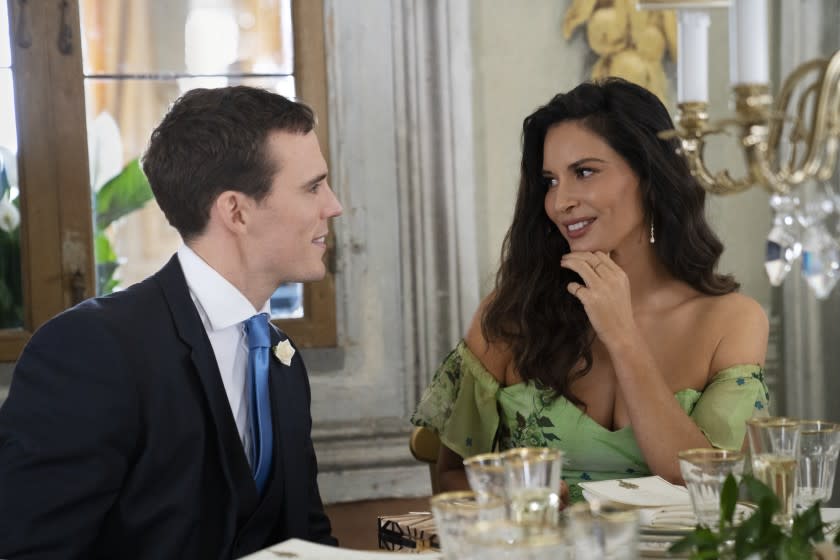Review: Olivia Munn-Sam Claflin rom-com 'Love Wedding Repeat' doomed by high-concept mess

It would have been interesting to see what British rom-com maestro Richard Curtis (“Four Weddings and a Funeral,” “Notting Hill,” “Love Actually”) might have made out of “Love Wedding Repeat,” writer-director Dean Craig’s problematic English-language, Italian-set remake of the 2012 French film “Plan de Table” (No great shakes itself if its 28% audience score on Rotten Tomatoes is any indication).
“Repeat” works extremely hard, but with wonky results, to sell its surreal twist: What if it was possible to back up and alter the moment in one’s wedding day that caused everything to go wrong — and make it all turn out right? A decent-enough idea.
At its best, there’s a bit of “Sliding Doors” meets Curtis’ 2013 charmer “About Time” to the conceit of this busy comedy of errors — lots and lots of errors — set during the wedding of the English Hayley (Eleanor Tomlinson) to the Italian Roberto (Tiziano Caputo) at a sumptuous, Rome-area villa. The opening-credits use of a rousing Italian version of the Tom Jones hit “Delilah” makes for a promising start.
But the obstacles here soon prove so contrived and the setups so schematic the movie can feel like a not-very-well-oiled, Rube Goldberg-like machine. And a predictable one at that.
It’s the kind of picture in which, early on, the beaming bride announces “Nothing could spoil this day,” and the whole thing instantly begins to fall apart. Place cards are mischievously switched, battles erupt, jealousies flare, secrets are exposed, wires are crossed, someone gets locked away in a closet and folks generally make fools of themselves (whether they realize it or not).
Then there’s the pivotal ruse in which a champagne glass is purposefully spiked with sleeping drops. Is there any doubt that the wrong guest will end up downing the drugged bubbly?
Unfortunately, the “repeat” section doesn’t occur until an hour in, by which time the film’s overly broad farcical situations and conflicts, though not without their sporadic appeal and the occasional chuckle, have worn thin.
Although the cast, including Hugh Grant-ish lead Sam Claflin (“Me Before You”) as Hayley’s devoted brother, Jack, who’s given a ridiculous number of chances here to get it right with gorgeous American journalist — and Hayley’s friend — Dina (Olivia Munn), does nimble work, their characters feel more like types than authentic people.
We’re told and shown who they are — Hayley’s anxious, male “maid of honor,” Bryan (Joel Fry), is a struggling actor; her lovestruck admirer, Marc (Jack Farthing), is a party-crashing cokehead; Jack’s ex, Amanda (Freida Pinto), is a self-centered nightmare — but there’s little bubbling beneath the surface.
The same goes for clueless, kilt-wearing dullard Sidney (Tim Key); Amanda’s aggressively insecure boyfriend, Chaz (Allan Mustafa); and the gabby, tactless Rebecca (Aisling Bea).
This lack of dimension limits our investment in these table mates and their largely self-inflicted predicaments. For example, it’s hard to have much sympathy for Jack when, in the movie’s three-years-earlier prologue, this supposed ladies’ man can’t put the bumbling and distractions aside and properly speak to the lovely, receptive Dina. Then again, there wouldn’t have been much need for the rest of the film, a lot of which revolves around Jack’s thwarted pursuit of Dina after she shows up unexpectedly — to Jack, anyway — at the wedding.
Jack and Dina spend so little actual wedding-day time together that when the script should have been building their relationship to help us root for its success, it flings them apart with constant interruptions and miscues.
If Craig (he wrote another frantic ensemble comedy, “Death at a Funeral,” and its faithful 2010 American remake) had dispensed with the “do-over” concept and found a more realistic, organic, daresay human way to repair the multipronged mess made here, this could have been a more relatable, balanced, truly romantic film. (A warm moment between Jack and Hayley recalling their late parents shows what might have been.)
You could do worse for streamed entertainment during these homebound days, but there are far better invitations to be had.

